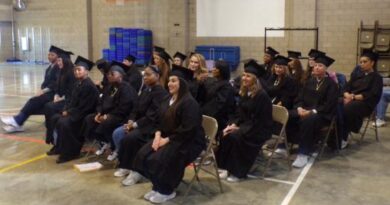CCWF and Soledad Meet in First Debate

In November 2024, educational communities at both Central California Women’s Facility (CCWF) and Correctional Training Facility in Soledad (CTF) anticipated a history-making virtual debate between the CCWF Fresno State Debate Team and the CTF Toastmasters Club.
Originally scheduled for Nov. 20, 2024, the war of words was postponed for nearly a month due to technical glitches. But on Dec. 17, 2024, the action finally began. It was hosted through Microsoft Teams. CTF teacher Roberta Schweers coordinated the event from the Soledad side, and Correctional Sgt. Ronald Glaze assisted with the day’s technology access.
The CTF team included Christopher Butler, Kenneth Guest, Rafael Hunt, Tramal J. Thomas, Bilji P. Varghese, Michael Washington, Anton Butler, Orlando Creswell, and Esteban Campos. The CCWF team included Mo Tien, Jennifer Fletcher, Valerie Nessler, Michelle Souza, Erica Olson, Mimi Le, Kandace Ortega, and Rebecca Braswell. They were coached by Douglas Fraleigh, professor of communication; Monica Summers, professor of criminology; and student coach Rhiannon Genilla, all from Fresno State.
This debate was part of an effort to build community, with the goal of launching a statewide debate league. This is the first inter-prison debate that has been held at CCWF.
The participants trained diligently for weeks to prepare for the challenge before them.
The teams debated two topics: whether “work-from-home” jobs — jobs that would allow those incarcerated to work remotely from their institutions –should be made available for incarcerated individuals and whether Norway’s criminal justice system is better than the American justice system.
In the first debate, CCWF’s Erica Olson argued that work-from-home jobs should be made available to incarcerated individuals. Olson’s main points were about flexibility as well as the ability to perform duties remotely and develop different technological skills.
“Establishing responsibility [constructive criticism, good work place ethic and honesty] not only helps promote rehabilitation but creates successful and productive members of society,” Olson said in the debate.
The Toastmasters delivered their counterargument maintaining jobs for incarcerated individuals would undermine the employment opportunities for citizens in the free world. Mimi Le brought the remarkable negative cross-examination. This speaker questions the opponent and where their evidence came from. Le declared they “had no data that is relevant to 2024.”
Jennifer Fletcher added that if people convicted of a crime worked from their cells, it would lessen costs for the state — they wouldn’t have to pay to incarcerate them and that person would still be paying taxes. Those who employ them could also receive tax breaks, she said.
In rebuttal, CTF argued that work from home wouldn’t be so different because individuals convicted of a crime still wouldn’t be paid a fair wage and incarcerated individuals are not given negotiation rights. Valerie Nessler came back at them with the conclusion, that through “marketable job skills, training, and free market capitalism, incarcerated individuals are worthy of the job at hand.”
CTF’s Christopher Butler offered a stirring thank you as he brought up the disadvantages for corporations “bringing jobs to incarcerated individuals when those jobs are equated with the loss of jobs in the community.” CTF’s team concluded that the community is better off with skilled labor being kept away from the system-impacted population.
In the second debate, CCWF’s affirmative team heralded the cause for Norway.
CCWF team member Souza opened with supporting evidence on Norway’s “increased rehabilitative programs which improve the standards overall.”
“The California Model, by contrast, is punitive and leaves much to be desired,” she argued. “Norway has proven to dramatically improve the rehabilitative procedures through the programs which led incarcerated individuals outside and into nature.”
CTF came back with the statement that a lower recidivism rate is possible through the rehabilitative work incarcerated individuals do.
CCWF team’s Braswell rebutted, “The punitive justice system the U.S. is over 70 years old. Norway overhauled their system from a cost perspective to human culture as they allot time and care for their citizens.”
The first debate went to CCWF. The second debate was a tie due to the strength of both sides.
Salina Medina, assistant principal of CCWF’s college programming, said, “This is obviously helping the students/graduates learn to debate in an educated fashion where the practices learned will help them with their rehabilitation journey.”
There are plans to expand the debate circuit throughout California prisons. Until then, both teams will continue to hone their skills and prepare for the next time they go head-to-head.



